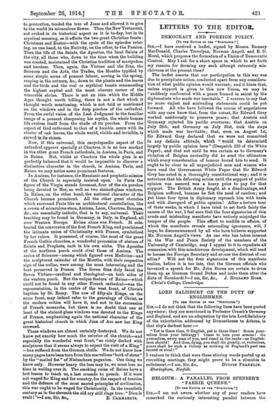LETTERS TO THE EDITOR.
DEMOCRACY AND FOREIGN POLICY.
[To TEN EDITOR Or TR. " SrECTATOR."] SIR,-I have received a leaflet, signed by Messrs. Ramsay MacDonald, Charles Trevelyan, Norman Angell, and E. D. Morel, which proposes the formation of a Union of Democratic Control. May I ask for a short space in which to set forth my reasons for deeming any such attempt extremely mis- chievous at the present time?
The leaflet asserts that our participation in this war was due to precipitate action, conducted apart from any considera- tion of what public opinion would warrant; and it hints that, unless support is given to this new Union, we may be "suddenly confronted with a peace framed in secret by the diplomatists who made war inevitable." I venture to say that no more unjust and misleading statements could be put forward. All who have followed the course of negotiations with any care know that, from the outset, Sir Edward Grey worked assiduously to preserve peace ; that Austria and Germany rejected his pacific overtures; that Austria on July 28th, and Germany on July 31st, took the steps which made war inevitable ; that, even on August 1st, Sir Edward Grey declared that we were not committed to any definite attitude, which " would be determined largely by public opinion here" (Despatch 123 of the White Paper) ; and that not until be was certain as to Germany's violation of Belgian neutrality did he send the ultimatum which every consideration of honour bound him to send. It ought to be clear to all unprejudiced men and women who have read the Government White Paper that Sir Edward Grey has acted in a thoroughly constitutional way ; and it is notorious that his deferring action until the support of public opinion was assured was a heavy price to pay for that support. The British Army fought at a disadvantage, and Belgium suffered, because he felt the need of caution ; and yet these four tyros in diplomacy reproach him with haste and with disregard of public opinion ! After a lecture tour of three weeks, in which I have tried to set forth fairly the causes of the war, I feel sure that the four signatories of this crude and misleading manifesto have entirely misjudged the temper of the people. This effort to meddle in affairs, of which the manifesto reveals astounding ignorance, will, I hope, be discountenanced by all who have hitherto supported Mr. Norman Angell's views. As one who has taken interest in the War and Peace Society of the members of the University of Cambridge, may I appeal to it to repudiate all connexion with this mischievous development, which will tend to harass the Foreign Secretary and arouse the distrust of our allies ? Will not the four signatories of this manifesto realize, before it is too late, that the German officials who invented a speech for Mr. John Burns are certain to dress them up as German Grand Dukes and make them utter the dicta of Bernhardi ?—I am, Sir, &c., J. HOLLAND Ross.
Christ's College, Cambridge.


































 Previous page
Previous page